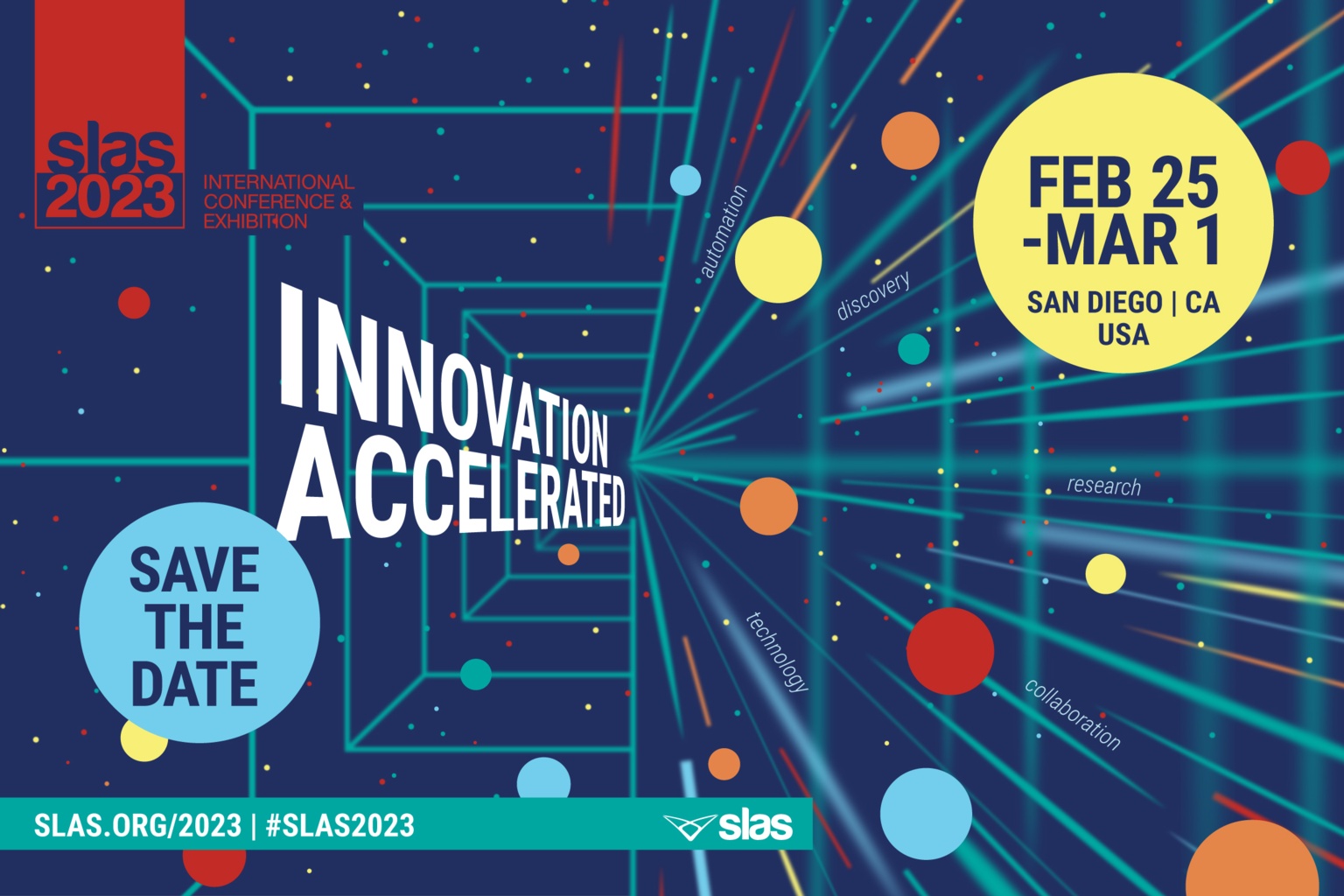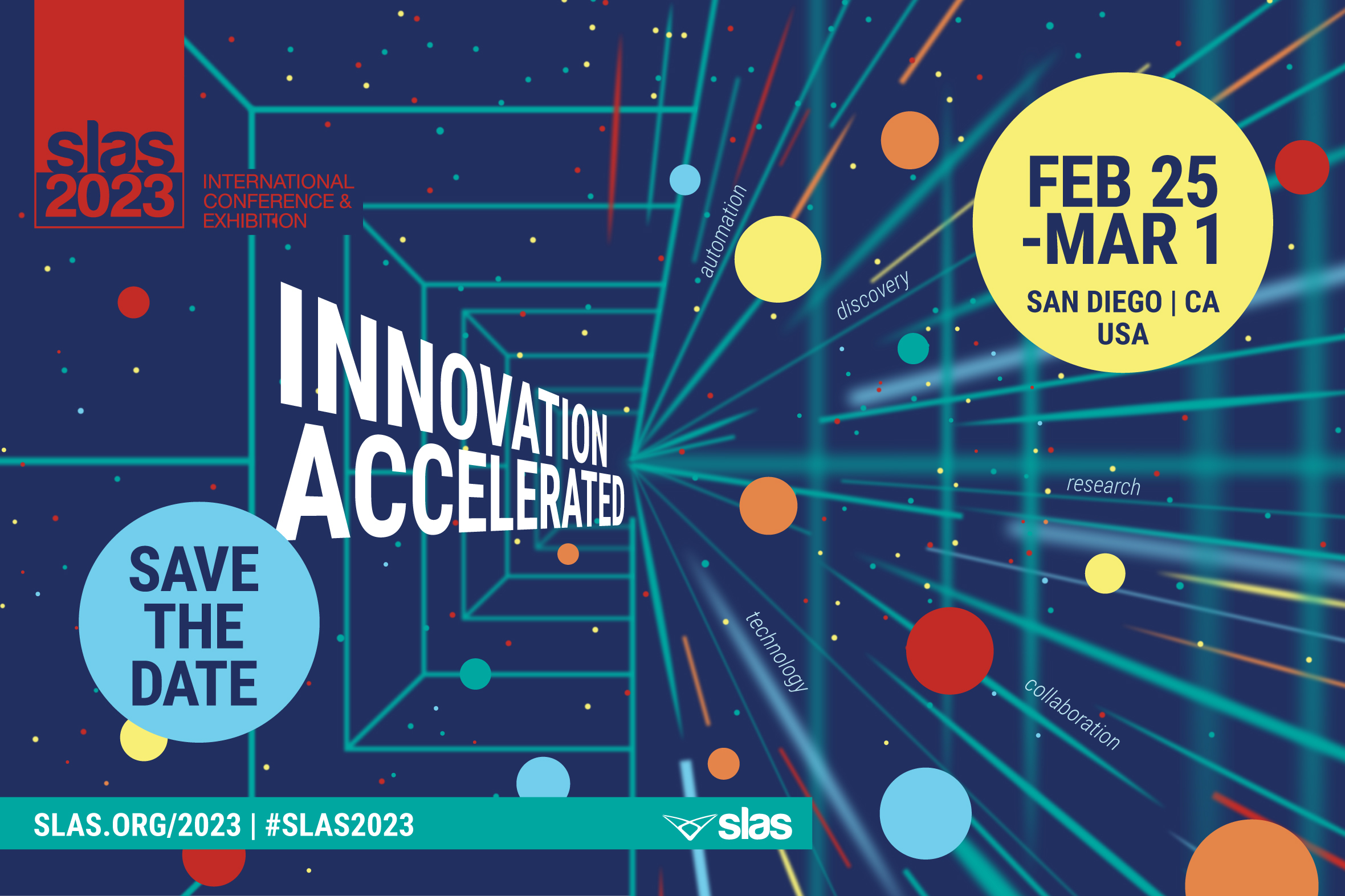February 25 - March 1, 2023
San Diego, CA, USA


February 25 - March 1, 2023
San Diego, CA, USA

Congratulations to the SLAS2023 Innovation Award finalists! These presentations will take place Monday, February - Wednesday, March 1, and the winner will be announced immediately after the closing keynote presentation on March 1.
Monday, February 27
Patient-Derived Micro-Organospheres Enable Precision Oncology (Precision Medicine and Diagnostics Track)
Presenter: Xiling Shen, Ph.D., Xilis
11:00 a.m.
Proteolysis Targeting Antibodies For Cell Surface Receptor Degradation (New Modalities Track)
Presenter: Jing Li, Ph.D., Genentech
3:00 p.m.
High-Throughput Phenotypic Screening by Machine Vision-Based Cytometry (Assay Development and Screening Track)
Presenter: Asako Tsobuchi, Ph.D., ThinkCyte
4:00 p.m.
Tuesday, February 28
GEARS: Predicting Transcriptional Outcomes of Novel Multi-Gene Perturbation (Data Science and AI Track)
Presenter: Yusuf Roohani, Ph.D. Cand., Stanford University
10:00 a.m.
Amphiphilic Particle Stabilized Droplet Assays for Scalable "Swarm" Sensing Based Diagnostics (Precision Medicine & Diagnostics Track)
Presenter: Vishwesh Shah, Ph.D. Cand., UCLA
10:30 a.m.
See-N-Seq: RNA Sequencing of Target Single Cells Identified by Microscopy (New Modalities Track)
Presenter: Jeong Hyun Lee, Ph.D., University of British Columbia
11:00 a.m.
Image-Based Screening of Pooled Genetic Libraries (Micro and Nano Technologies Track)
Presenter: Avtar Singh, Ph.D., Genentech
3:30 p.m.
Wednesday, March 1
A Novel Platform for Automated and Efficient Handling of Scaffold-Free 3D Cell-Culture Models Enables Well-Controlled Large-Scale 3D in Vitro Drug Screening (Automation Technologies Track)
Presenter: Viktoria Zieger, Ph.D. Cand., Imtek
9:00 a.m.
Okomera: Droplet Microfluidics to Automate Microtumor Formation and Screening for Precision Cancer Medicine (Micro and Nano Technologies Track)
Presenter: Raphael Tomasi, Ph.D., Okomera
9:30 a.m.
Rational Vaccinology: In Pursuit of the Perfect Vaccine (Micro and Nano Technologies Track)
Presenter: Chad Mirkin, Ph.D., Northwestern University and Exicure
11:30 a.m.
(Presentation times subject to change. Check the Event Scheduler to confirm presentation session and time.)
SLAS2022 Innovation Award winner: Emma Chory, Ph.D. (MIT; Cambridge, MA, USA): Electronic Laboratory Neighborhood article
SLAS2021 Innovation Award winner: Sisi Chen, Ph.D. (Caltech): Electronic Laboratory Neighborhood article, New Matter podcast
SLAS2020 Innovation Award winner: Joseph de Rutte, Ph.D. (University of California, Los Angeles)
SLAS2019 Innovation Award winner: Christian Soitu, Ph.D. (Oxford University)
The SLAS Innovation Award consists of a $10,000 check presented to the winning presenting author (see Rules and Regulations: Monetary Disbursement, below). Subject to SLAS requirements and the approval of the SLAS Awards and Grants Advisory Committee, the winning presenting author is also:
The winner is also granted a complimentary one-year Premier Membership to SLAS. The award-winning work will be featured in an issue of SLAS Technology and/or SLAS Discovery following the conference, and the winner will also be profiled in a future issue of Electronic Laboratory Neighborhood, SLAS’s e-zine.
The panel of judges is comprised of individuals approved by the SLAS Awards and Grants Advisory Committee and represents various technologies and applications within the SLAS International Conference and Exhibition curriculum.
Should a tie occur after scoring is final, the SLAS President is the tiebreaker. Judges may not have or have had any formal association with the candidates, either direct or indirect. Judges must recuse themselves from evaluating any candidate wherein there exists a relationship such as family, business, financial or other, e.g. academic or student/professional association. Judges must sign a non-conflict of interest certification form ensuring no improper purposes. It is expected that any issues are declared by the judges. The SLAS Awards and Grants Advisory Committee Chair makes the final decision on any questionable issues.
In assembling the program, the SLAS2023 Program Committee selects qualifying podium presentations from the abstracts received in the Call for Abstracts submission period. To qualify for entry into the SLAS Innovation Award contest an abstract must be received prior to the Call for Abstracts deadline of Monday, September 12 and the author must opt-in for consideration using the appropriate checkbox. When opting-in, applicants will be asked to provide a statement of key innovation and impact of their work to the SLAS community.
Working from the conference's selected abstracts, the panel of judges scores all the abstracts thereby identifying the SLAS Innovation Award finalists for evaluation at SLAS2023. The panel of judges will review only those podium presentations selected and slotted for the conference by the SLAS2023 Program Committee. Short course instructors, poster presenters and plenary speakers* are not eligible unless they have also been accepted into the SLAS2023 Scientific Program. All candidates must adhere to the SLAS abstract submission policies, timelines, rules and regulations.
The SLAS2023 Program Committee selects podium presentations for the SLAS2023 International Conference and Exhibition. The panel of judges will review and score the abstracts. (See "Scoring" below). The Chair assigns all abstracts for evaluation to the panel of judges. Each of the podium presentations will be scored by a minimum of two judges.
Upon completion of the first scoring phase, the panel of judges will convene by teleconference to select the top 20 to 25 candidate presentations. These top candidates will be offered the opportunity to submit an extended abstract for review by the panel. An extended abstract is strongly encouraged by the judges to allow better differentiation of the leading candidates. Failure to submit information in time for the next selection phase will jeopardize the author's chances for inclusion as a finalist.
The judges will take extended abstracts, review them, and tehn meet again as a group to narrow down the canddiate pool to 10 finalists. Upon completion of the second phase, the SLAS Innovation Award judges will announce the SLAS Innovation Award finalists.
As part of the preliminary screening process, and in coordination with the Chair and panel of judges, a candidate author may be contacted to answer further questions.
*Plenary speakers are not eligible to submit their plenary talk for consideration for the SLAS Innovation Award. However, those individuals giving a plenary talk may also choose to submit an abstract to be considered for the SLAS2023 Scientific Program and to be considered for the SLAS Innovation Award upon acceptance into the program.
The panel of judges will attend and evaluate each of the candidate's presentations and will collectively select the winner of the SLAS Innovation Award after all presentations are complete. While scoring the presentations, the judges will consider:
Each candidate presentation will be judged on a scale of one to five (with five being the best possible score; integers only). The scores of all judges will be consolidated for the final decision.
The SLAS Innovation Award panel is appointed by and serves at the discretion of the SLAS Awards and Grants Advisory Committee and the SLAS Board of Directors. The SLAS Innovation Award will follow the timeline below:
Candidates are encouraged to be Premier Members of SLAS to participate in the award program and/or win the SLAS Innovation Award; however, membership is not required.
All finalists are asked to submit a previously unpublished scientific manuscript (original research or a related review paper) for peer-reviewed publication in SLAS Discovery or SLAS Technology by May 2023. This manuscript must be received before the $10,000 cash award is disbursed. These requirements will be outlined in the Letter of Intent allowing SLAS to use the abstracts for press releases and other media announcements.
The panel of judges will review only those podium presentations selected and slotted for the conference by the SLAS2023 Program Committee (not short courses, posters or plenary presentations). All candidates must adhere to the SLAS abstract submission policies, timelines, rules and regulations*1.
The following individuals are not eligible to participate in the SLAS Innovation Award program:
Candidates affiliated with someone on the panel of judges are permitted to participate, but the judge must recuse him or herself from evaluating that candidate.
* The SLAS2023 Program Committee comprises of a Chairman, Associate Chairman, Track Chairs and Associate Track Chairs. Session Chairs are not members of the SLAS2022 Program Committee, and therefore are eligible to participate.
*1Abstract Submission Policy
SLAS invites academicians, scientists and post-doctoral and graduate students to submit abstracts for scientific talks and poster presentations for this international educational forum by Monday, September 12. Presentations will be hand-picked by the Annual Conference Program Committee.
To ensure that your abstract receives proper consideration for this award, please be sure to include information on methods, results and conclusions in your submitted abstract.
Rules, regulations and guidelines are subject to change at the discretion of the SLAS Board of Directors in accordance with bylaws, policies and procedures.
The winner of the $10,000 cash prize will be announced on the final day of SLAS2022, immediately preceding the final keynote session. The following rules apply:
Discrimination based on race, religion, gender, sexual orientation, age, national origin, ethnicity, veteran’s status or physical or mental disability regarding the SLAS Innovation Award is prohibited. Each candidate shall be evaluated based on the award's criteria, which are tied to SLAS's exempt purpose of advancing the science and education of technology in the laboratory.